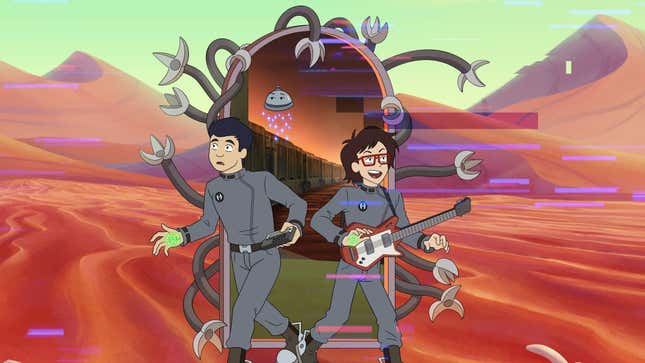
When Infinity Train first premiered on Cartoon Network in 2019, its dark and mysterious story brought a different kind of energy to the network’s slate of animated programming. Though Infinity Train was certainly a show that could appeal to children, it also felt crafted to hook an older, broader audience with its surprisingly contemplative exploration of the darkness that all people feel at different points in their lives.
Infinity Train’s premise—that a techno-metaphysical train zooms around the universe picking up passengers in times of existential crisis—lent itself to the potential for endless chapters introducing new characters who might keep the show changing and evolving as they became the train’s focus. After Infinity Train’s first two books (a.k.a. seasons) told a closely interconnected tale, the series ended up jumping to HBO Max, a move that seemed to gel with the show’s somewhat more mature tone. According to series creator Owen Dennis, Infinity Train’s move brought the series to the platform where it was originally intended to have premiere were HBO Max’s launch not delayed. While there’s no way of knowing what sort of show Infinity Train might have been, the show evolved significantly on HBO Max in ways it might never have been able to on regular cable.
Following the first two seasons, which followed the respective adventures of preteens Tulip (Ashley Johnson), Jesse (Robbie Daymond), and Tulip’s reflection, Lake (also Johnson), both Book 3, “Cult of the Conductor,” and Book 4, “Duet” shifted focus to older characters with drastically different origins and reasons for being on the train. After being initially introduced as enigmatic antagonists, Grace (Kirby Howell-Baptiste) and her friend Simon (Kyle McCarley) become Infinity Train’s heroes in Book 3 as the series explored what life was like for those who spent long periods of time on the train actively trying to make the glowing numbers on their hands increase.

Unlike Tulip, Lake, and Jesse—who all came to understand that getting one’s number to go down was the key to escaping the train—Grace, Simon, and the other members of the Apex (a clan of train-bound children) all saw their numbers as badges of honor that spoke to the freedom the train afforded them. Through Grace and Simon, Infinity Train deepened its lore in ways that gave new meaning to the train, and the endless adventures it seemed to want passengers to embark upon while riding it. As fun and lighthearted as Book 3 often was, what made it feel markedly more serious and foreboding than its predecessors was the way that characters were repeatedly pushed to deal with the consequences of their interpersonal actions. When the teens met a young girl named Hazel (Isabella Abiera), her existence on the train gradually began to pose an important moral dilemma to Simon, Hazel, and the rest of the Apex that had the potential to upend their entire way of life. Compared to Infinity Train’s earlier installments, Book 3 felt more lived-in the way one might expect from a series that had been following those characters from the very beginning. But by not worrying too much about fleshing out the entirety of the newcomers’ backgrounds, Infinity Train gave itself the space to hone in on its characters’ present day emotions with clarity that’s invaluable to serialized storytelling in all forms.
The same held true for Infinity Train’s Book 4 as it introduced best friends Ming-Gi (Johnny Young) and Ryan (Sekai Murashige) at a point in their lives when their bond had grown thin. Ming-Gi and Ryan’s journey onto the Infinity Train revealed much more about the machine’s inner workings and how it comes to identify those who might benefit from its unique experiences. But Book 4 also demonstrated Infinity Train’s ability to effectively “start over” and become the perfect jumping on point with each season, as it fleshed out Ryan and Ming-Gi’s story with far less of a direct connection to previously established characters and plot lines. Watching Book 4 now, it’s easy to see how the new, more complicated voice Infinity Train’s writers room found struck a balance between Book 1's initial lightheartedness and the harsh realities that come with growing up. As deeply personal as every passenger’s reasons for being on the train always were, Ryan and Ming-Gi boarding together illustrated how the Infinity Train would purposefully bond two people together on special occasions, emphasizing the importance of their pre-train relationships.
It is astonishingly easy to lose track of television and streaming series in an age where networks and their digital platforms churn out projects at a breakneck pace in order to keep audiences’ attention with the promise of new things to watch. Infinity Train might be over now, but for those who might have fallen off the series before its end, or are only hearing about it just now, it’s a show worth spending some time with, if only to think of the possibilities.
Infinity Train is now streaming on HBO Max.
For more, make sure you’re following us on our Instagram @io9dotcom.